Women’s rights in Bahrain: Steady Progress Towards Equality
Mona Almoayyed, Managing Director of Y. K. Almoayyed & Sons
Women and men in Bahrain are paid the same wages; there is no differentiation according to the labor law. On the other hand, for women there are lots of privileges. For example, for maternity with the new labor law it is 60 rather than 45 days.
Interview with Mona Almoayyed, Managing Director of Y. K. Almoayyed & Sons
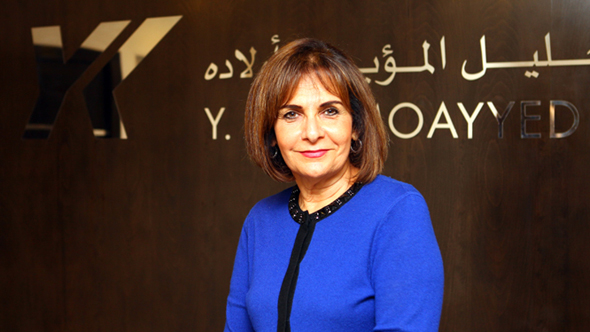
How would you describe the difference between women and men in Bahrain, especially in terms of social freedom?
If we talk about women in terms of labor and the economic side of women versus men in the workplace, I think there is a certain amount of equality there. Women and men in Bahrain are paid the same wages; there is no differentiation according to the labor law. On the other hand, for women there are lots of privileges. For example, for maternity with the new labor law it is 60 rather than 45 days. Women are now allowed to work at night while under the old labor law they were not allowed to work at night. Also now, they have a greater number of hours for feeding their babies after delivery. So they have lots of privileges because they are women and also women retire five years before men.
Women are now allowed to work at night while under the old labor law they were not allowed to work at night. Also now, they have a greater number of hours for feeding their babies after delivery. So they have lots of privileges because they are women and also women retire five years before men.
On the social side, women in Bahrain have not been justified by our laws. For example, there are no family laws in Bahrain. For the Sunni sector, there are family laws but there are no family laws for the Shia which means in the case of divorce between men and women, the mother does not have laws to protect her children. It’s all according to the research of the judge and the court. He goes back to the books and of course there is always no justification for women; they are always on the men’s side. They always favor the husband over the wife and in many cases the women really suffer because of that.
Of course you know that is something that we all face; even in our religion women are not the same as men. I mean a woman inherits half of what the man does. If somebody dies and he has only daughters, some of his inheritance goes to his brothers and sisters. But if he has one son, all his inheritance goes to his son which is also a bit unfair. But these are on the religion side and we all know how in the Islamic law, a man can marry four wives which we also find very unfair for women. But this is my personal opinion. It’s controversial but I really feel it’s not fair that a man should marry four wives without an excuse.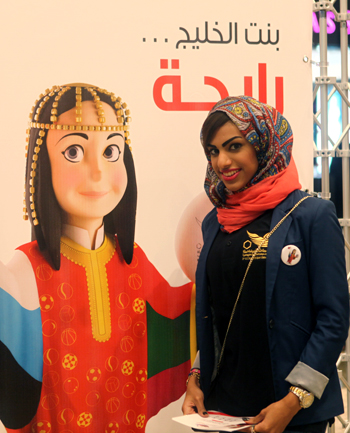
While there are some regional and national laws to protect women’s rights, are they actually actively practiced in society?
Yes they are. Like with Convention Eliminating All Forms of Discrimination Against Women (CEDAW), we have an agreement with CEDAW which is against the discrimination of women. In Bahrain it is all in practice. They cannot discriminate against women over men. Of course, many companies might practice discrimination and get away with it but according to the law, they are not discriminated against.
How widespread would you say this practice is of hidden discrimination?
There is more unemployment for women than for men because lots of companies prefer not to employ women because women will get pregnant and get married and be busy with her children, so you find that companies are reluctant to employ women. But this is their personal choice. But in my experience, we’ve been very lucky in employing Bahraini women in this company. We find that Bahraini women stay longer, they don’t change jobs, and they are very loyal. Of course when they get pregnant this is a period of time when they are more absent, but we find that they are very hard workers.
How would you describe Bahrain’s position on women’s right compared to other regional players such as Saudi or more liberal countries?
I feel in terms of laws we are all similar but Bahraini women were educated much earlier and longer than other gulf nationals. We have had schools for women since the 1920s. On the other hand, in the UAE and Qatar and others, it started at a much later date;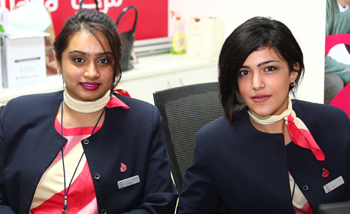 therefore you find more awareness among women here. We started having different societies for women in the 1950s so women are more pro-active. They help, they do charity work, and they started this earlier than other countries. Now they are catching up with Bahrain. Bahraini women tend to be a bit more liberal in terms of dressing in European clothes and not having to wear the black veil. In Bahrain you see this is normal. I think Kuwait is also very similar to us but other countries are more traditional.
therefore you find more awareness among women here. We started having different societies for women in the 1950s so women are more pro-active. They help, they do charity work, and they started this earlier than other countries. Now they are catching up with Bahrain. Bahraini women tend to be a bit more liberal in terms of dressing in European clothes and not having to wear the black veil. In Bahrain you see this is normal. I think Kuwait is also very similar to us but other countries are more traditional.
What factors are holding back Bahrain society from taking a more equalitarian position? Bahrain is still probably the best place for women but what are some of the challenges or factors holding Bahrain back?
In my opinion, the biggest drawback is our political situation. In Bahrain we have this problem with controversy and opposition. Bahrain is more democratic than any other gulf state. We have an elected House, the Shura Council, and more than 500 societies which you don’t see in other gulf states. That’s why people are very brave; they talk and express their opinion and that’s why you get more politics than in other gulf states. It could be part of the progress toward democracy but this instability also affects Bahrain’s progress, women’s progress and the whole country.
No I really don’t see the connection between the opposition and the women’s uprising in Bahrain.
Did equal rights for women act as one of the driving forces behind the protests that we saw in 2011? Was that a factor?
No I really don’t see the connection between the opposition and the women’s uprising in Bahrain. Basically the opposition was unhappy with certain things in Bahrain and they wanted an uprising. Women were part of it, not because they wanted to ask for equal rights or anything like that. On the contrary, people who are in the opposition are people who don’t want family. The opposition as I see it is our way to democracy but what I don’t like about our opposition is that they are not peaceful. They are doing so many things to destroy the economy by starting fires, throwing Molotov cocktails on policemen, blocking roads, and putting bricks on the road to stop people from going to work. That’s not proper, peaceful opposition which comes with democracy.
I get very upset when I see international opinion about Bahrain talking about human rights and that the government is not respecting the opposition. If these things happen in the west and a person throws Molotov cocktails at policemen, what would happen? On many YouTube videos from Bahrain, we see the police are running and the opposition is behind them with metal rods and burning bottles. They are quite aggressive. So I feel this is one of the reasons that holds Bahrain back because they are worried about the opinion of the rest of the world so they are quite lenient with the opposition. This is really holding back the economy. Lots of banks left Bahrain because of all this trouble.
Mr. Bucheery of BBK Bahrain said there wasn’t any decline in the number of banks in Bahrain.
I can think of a few who left two years ago. I can think of two big banks who had their headquarters in Bahrain. Now they put a branch in Bahrain and their headquarters in Dubai. But there were not that many of course.
In your opinion is there a difference in the treatment of women before and after the uprising?
No nothing has changed at all because the uprising had nothing to do with women’s rights. It was just about political agenda which is sectarian. They want to divide the people so that people are from this sector or that sector. This is all people with hidden agendas.
Was the establishment of quota minimums for representatives in the Chamber of Commerce and Industry starting in 2012 effective? Has the number of women in government industries increased?
Yes, this was a big victory for Bahrain and women in Bahrain that there is a quota for women in the Chamber of Commerce. Starting this October there has to be two women in the Chamber which is really what we have been asking for. In my opinion, even in the Board of Directors there should be at least two women in any company. This is because people don’t trust women and they prefer to employ men because it’s safer. I feel that we need to push this and I think it’s done in some European countries that they established a quota for women. I think it was Holland or Denmark that there should be two or three women in each company. I think we should do the same. This quota is only in the Chamber of Commerce but I think there are more women compared to before. Of course, there are four Ministers who are women, as well as four Bahrain Ambassadors, four Members of Parliament, and about eleven members of the Shura. So there is a bigger proportion of women in a high position in Bahrain than there used to be. In general, I think the government is trying to empower women.
Do you believe we will be seeing more women holding leadership positions within the next five years?
Yes, I’m sure there will be many more women in leadership positions. I think the women who have been elected in the House of Representatives have really proven themselves and they have really taken on so many issues that men before did not care about. I think people have more confidence in women now as a result of this.
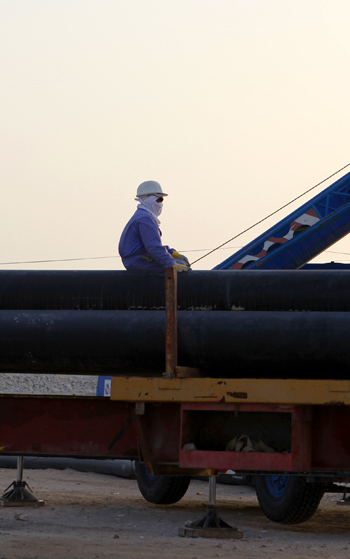 About migrant workers, the 2010 census reported that there were about half a million nationals in Bahrain and about 666,000 non-Bahrainis make up about 54% of the total population. Has there been an influx or outflow of non-nationals over the past few years?
About migrant workers, the 2010 census reported that there were about half a million nationals in Bahrain and about 666,000 non-Bahrainis make up about 54% of the total population. Has there been an influx or outflow of non-nationals over the past few years?
No there’s been inflow of more non-Bahrainis in the labor markets since that time. Again, I’m a strong believer in asking for the rights of migrant workers. We really believe we owe these people so much for building our country. All this construction in Bahrain is because of migrants. They do the jobs which Bahrainis don’t want to do and we really owe it to them to give them more rights. I believe in minimum wage for migrant workers. I think all the GCC countries should get together and create a minimum wage for migrant workers. Free visa in Bahrain is considered as a form of human trafficking when a Bahraini gets a visa for a migrant worker and impose an amount of money on the poor laborer which is at present BD800/- to BD1000/- every 2 years.
Some of the wages in this country are as low as BD40/- to BD50/- dinars for a laborer; because he’s paid so little he cannot afford to live in a decent place. He’s forced to live in accommodations which are below human standards. I don’t know if you read about the recent big fire in Bahrain in which 13 laborers died in their home. This was because this building was not meant for laborers; it was just a house and there were about 10 people in each room. The fire started and they couldn’t save them so they died. This is very sad and I feel if we have a minimum wage, at least these people will have a decent living. They should have decent accommodations and not be living in sub-standard houses like that.
Some of the wages in this country are as low as BD40/- to BD50/- dinars for a laborer; because he’s paid so little he cannot afford to live in a decent place.
Of course another big problem is with accidents at work because they are mostly illiterate and are not aware of the dangers they may face. So they go on scaffolding without protection, without helmets, and without shoes. They are supposed to wear these but they don’t and the company wants to save money so they don’t buy the workers shoes and helmets. So you hear every day a few people die in accidents at work. Also what’s really worrying is the number of suicides among migrant workers in Bahrain. In 2012, there were 53 people who committed suicide and this year there have been about 13 people. There are many accidents and many suicides; it’s very
sad.
How do you describe the relationship between nationals and non-nationals in Bahrain? Is there competition for jobs? Do you feel there are rising tensions? The opposition especially are arguing about these jobs. How do you see the situation?
Yes I see the competition in higher-level jobs such as managers and assistant managers. You find that some companies are not willing to pay Bahrainis as much as they pay an expat because they say he’s only Bahraini. I feel there is some discrimination because we should pay Bahrainis more than the expat because the Bahraini is living in his country. We don’t pay for his accommodation, we don’t pay for his travel, and we don’t pay for all these expenses. So we should adjust our scale to pay more for Bahrainis and encourage Bahrainis to be in the higher positions.
On the lower jobs I don’t think there is that much competition because Bahrainis are not willing to work as laborers or cleaners, so there is no such competition. I think what happened to Bahrain with the introduction of the LMRA (Labor Market Regulatory Authority), which imposes BD10/- per month on each expatriate working in Bahrain. The money which is collected from this fee is kept in a fund called Tamkeen which is spent on training Bahrainis, given as loans to small and medium enterprises.
Do you see rising tensions between migrant workers and Bahrainis?
No I don’t see that at all. I think the opposition likes to promote this idea. They don’t like the migrant workers so they go and attack them in villages and such, but I don’t see that at all. In Bahrain, people in general are very kind and helpful and if you ask any of the migrant workers who work in Bahrain compared to other countries, they are really well looked after by their employers.
You are a proponent of the minimum wage policy but on the other hand the implementation would affect Bahrain’s competitiveness among other GCC states. What progress has been made? Some of the free market proponents argue that minimum wage will be detrimental to free market policies.
I disagree with this. In the first world, there is a minimum wage for everyone and in Bahrain we have minimum wage for Bahrainis. So I don’t see why we don’t have a minimum wage for foreigners. But I think it needs to be done throughout the gulf. When the GCC meets they should decide on a minimum wage. It doesn’t have to be as high as the national one but at least there should be a decent wage to live a decent life. I think we are campaigning for this and we really want it to happen although considering I come from the business side, I feel like when you construct a building, the money you pay the laborers is so small compared to the material you use for the building. So it will just increase the cost marginally not by a huge amount. I really feel like humans should be treated better than how we treat our foreigners here.
At the same time, it is an individual design. These migrant workers decide if they want to work for that wage because it’s still better than what they get at home. Do you not think that the market should determine the minimum wage?
No I feel because when the migrant workers come to Bahrain they are unaware of the standard of living here. They think they will make 40 dinars and in their country it buys them a lot of things and they can live a good life there. But in Bahrain, life is very expensive so they end up with very minimum food and substandard living because they can’t make ends meet and they have to send money to their families. So in a way, it’s against human rights to take advantage of poorer people. We are here in Bahrain and we consider ourselves to be a petrol-rich country so why should we pay our laborers minimum salaries if we can pay them more money and let them live a good life and help their family. Of course, before they come to Bahrain, they have to pay agents in India. In some cases, they pay something like 1000 dinars and they sell their homes, their jewelry, to come to Bahrain, thinking they will make their fortune here. So they end up here in more debt and that’s why you see the number of suicides which is 53 last year. All because of this problem of not being able to make ends meet. They don’t want to go back home and face more debts. I feel it’s inhuman to pay them so little.
Back to the business, it’s one of the leading conglomerates. What are your expectations for 2013?
I’m very optimistic. I think we are finished with the worst which was in 2011 where business really dropped substantially. 2012 has been a good year in the automobile section. Construction is down. Because we are diversified, there are many areas which are low such as building materials, construction and electronics but we are much better in automobile sales. But I feel that 2013 is going to be a better year.
Do you feel the business climate improving and it is impacting your business?
Yes, the business confidence in Bahrain is on the rise, for example, the first two months have been a record for us and we have fewer problems. Compared to last year, even during the day you would hear demonstrations downstairs blocking roads. The government is now stricter with preventing the opposition from distracting life, especially the business side. We are also getting help from GCC countries which I’m sure will help with construction and building materials and will help the economy as a whole. It will pump more money into the economy.
I think the government policy is really helping the businesses and helping to also find jobs for Bahrainis. I’m really optimistic with the dialogue which has started with the opposition.
Do you feel that this optimism is also shared by people in Bahrain that they have seen all the struggles and want to move on? Or is it just the government policies that enable this?
I think the government policy is really helping the businesses and helping to also find jobs for Bahrainis. I’m really optimistic with the dialogue which has started with the opposition. I think they have had six meetings and I feel in the end, most people don’t want this trouble of fighting and getting at each other. It’s even spoiling the relationships between people in Bahrain. So we are all fed up with this and we just want to live peacefully, whatever religion or sector we are in. We’ve always lived like this in Bahrain. We’ve always had different religions and sectors in Bahrain. I even remember my grandfather when we were little, he used to prepare food for all his Hindu friends on their special days and send them from his house to his Hindu friends. We had a Jewish family next to our family which is down the road from here. There were lots of Jewish families and my mother had so many stories of her Jewish friends and how they used to cook for them on Saturday because the Jewish people are not allowed to burn fire on Saturdays. I feel happy to see this in Bahrain – this feeling of living together in peace.
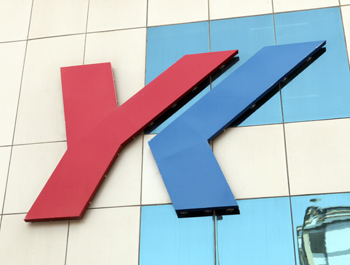 What is your strategy for 2013 and beyond? Has anything changed significantly?
What is your strategy for 2013 and beyond? Has anything changed significantly?
We have a business strategy for Y.K. Almoayyed & Sons to develop some businesses outside of Bahrain and we are trying to develop those businesses. We have some in Dubai, Qatar and Oman and we are looking at Saudi Arabia as well. So we are diverting some resources out of Bahrain but we are expanding in Bahrain as well with the ministry housing. We are bidding for some of this housing. We are quite optimistic and are trying to increase our Bahrainization wherever possible. We have looked at our HR policies on how to train Bahrainis, how to motivate them and wherever possible put a Bahraini under a non-Bahraini to be trained in that job. So I’m very optimistic. As of today, 30% of our employees are Bahraini which is much more than any Gulf state.
What is your growth prediction for this year?
We are hoping to grow by at least 10% this year in Bahrain and in other countries. We are still new there and had a bad year last year outside Bahrain so we are hoping to go back to where we were.
How do you compete with all the other established players in other countries?
We can’t compete with Al Futtaim for sure but we bought a business in Dubai five years ago that is doing very well. It’s not a huge business but it’s really doing very well. We are not competing with big players but we are just getting our share of the market.
Do you have anything else to add?
Because of what happened in Bahrain politically, we are trying to also promote non-sectarianism and dialogue between all Bahrainis. We have a society that’s been in Bahrain ten years called the Al Muntada Society which means forum in English. The main objective is to bring together as many young people as possible once a month for a forum to discuss various issues like women’s rights, migrant workers, divorce and any social issue. We are hoping to create more dialogue between young Bahrainis for a better future.